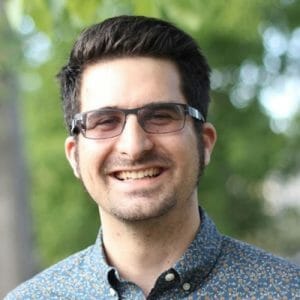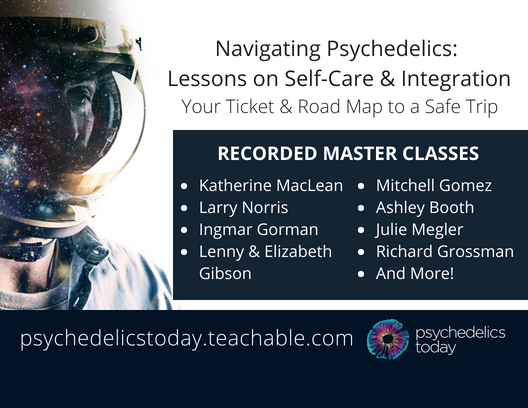Elizabeth Nielson and Ingmar Gorman - The Importance of Psychedelic Integration Training for Therapists
Release Date: 02/18/2020
 PT 646 - Manvir Singh: Shamanism the Timeless Religion
PT 646 - Manvir Singh: Shamanism the Timeless Religion
Psychedelics Today
Manvir Singh joins Psychedelics Today to unpack what shamanism means and why the term matters now. Singh is an anthropologist and author of Shamanism: The Timeless Religion. He argues that shamanism is not limited to “remote” societies or the past. Instead, it reliably reappears because it helps humans manage uncertainty, illness, and the unknown. This episode is relevant for the psychedelic community because “shaman” often gets used loosely, or avoided entirely. Singh offers a clear framework for talking about shamanic practice without leaning on romantic myths, drug-centered...
info_outline PT 645 - Oli Genn-Bash: Functional Mushrooms, Hype Cycles, and Mycelial Thinking
PT 645 - Oli Genn-Bash: Functional Mushrooms, Hype Cycles, and Mycelial Thinking
Psychedelics Today
(Brighton, UK) joins Joe Moore for a grounded conversation on the boom in functional mushrooms and why the category may be moving too quickly. As the founder of , Oli works with consumers and brands to demystify functional mushrooms, with a focus on education, traceability, and realistic expectations. The conversation begins with a critique of wellness hype cycles. Oli explains how consumer desperation for help with anxiety, sleep, stress, and cognition can create an opening for a rapid wave of products that are not always grounded in careful sourcing or clear science. Using as a case...
info_outline PT 644 - Tricia Eastman: Seeding Consciousness, Ancestral Wisdom, and Psychedelic Initiation
PT 644 - Tricia Eastman: Seeding Consciousness, Ancestral Wisdom, and Psychedelic Initiation
Psychedelics Today
In this live episode, joins to discuss . She explains why many Indigenous initiatory systems begin with consultation and careful assessment of the person, often using divination and lineage-based diagnostic methods before anyone enters ceremony. Eastman contrasts that with modern frameworks that can move fast, rely on short trainings, or treat the medicine as a stand-alone intervention. Early Themes: Ritual, Preparation, and the Loss of Container Eastman describes her background, including ancestral roots in Mexico and her later work at Crossroads Ibogaine in Mexico, where she supported...
info_outline PT 643 - Logan Davidson - American Ibogaine, State Strategy, and the Future of Psychedelic Policy
PT 643 - Logan Davidson - American Ibogaine, State Strategy, and the Future of Psychedelic Policy
Psychedelics Today
Logan Davidson joins the show to talk about the fast-moving world of Ibogaine in American and why state-based leadership is shaping the future of psychedelic reform. Davidson is the executive director of , the legislative director at , and a key strategist behind Texas’ landmark interest in ibogaine research. He also advises for . His work sits at the intersection of science, policy, and lived experience, and this conversation offers a clear look into what is happening right now. Early Themes: The Rise of State Advocacy Davidson explains how he entered politics at nineteen and how his...
info_outline PT 642 - Michael Sapiro PhD - Truth Medicine, Psychedelics, and Living Your Truth
PT 642 - Michael Sapiro PhD - Truth Medicine, Psychedelics, and Living Your Truth
Psychedelics Today
In this episode, joins Kyle Buller to explore truth, healing, and psychedelic-assisted psychotherapy through the lens of his new book, . A clinical psychologist, ordained Zen Buddhist monk, retreat leader, and fellow at the Institute of Noetic Sciences, he blends Buddhist psychology, trauma work, and consciousness studies. The discussion focuses on how people discover and live their truth, and why that truth becomes the core medicine in healing. Early in the Podcast with Michael Sapiro describes how years of clinical work and retreat facilitation shaped his understanding of healing....
info_outline PT 641 - Joe Moore & Kyle Buller - Holotropic Breathwork, Somatics, and Foundations for Psychedelic Work
PT 641 - Joe Moore & Kyle Buller - Holotropic Breathwork, Somatics, and Foundations for Psychedelic Work
Psychedelics Today
sits at the center of this wide ranging conversation between Psychedelics Today co-founders Joe Moore and Kyle Buller. Drawing from decades of personal practice and assorted types of breathwork facilitation, they explore how breathwork methods from the Grof lineage including can prepare people for psychedelic work, support difficult journeys, and deepen integration over time. Kyle shares how his near death experience, somatic training, and breathwork facilitation shaped this new course on breathwork foundations, while Joe reflects on how reading Dr Stanislav Grof and years of experience in...
info_outline PT 640 - Alexander Beiner - Psychedelics, Culture, and the Games We Play
PT 640 - Alexander Beiner - Psychedelics, Culture, and the Games We Play
Psychedelics Today
Alexander joins Psychedelics Today to explore how psychedelics, culture, and power shape each other. A writer, facilitator, and co founder of the conference and the media platform , he has spent years thinking about how psychedelic experiences ripple into politics, economics, conflict, and community. In this episode, he and Joe trace the path from early internet forums to today’s psychedelic renaissance, and ask what it would mean to bring a truly psychedelic perspective into our institutions. Beiner is less interested in psychedelics as a niche medical tool and more interested in how they...
info_outline PT 639 - Evelyn Eddy Shoop PMHNP-BC: Lived Experience, Qualitative Data, and the Future of Psychedelic Care
PT 639 - Evelyn Eddy Shoop PMHNP-BC: Lived Experience, Qualitative Data, and the Future of Psychedelic Care
Psychedelics Today
Overview Evelyn Eddy Shoop PMHNP-BC joins Psychedelics Today to share her journey from Division I athlete to psychiatric mental health nurse practitioner and psilocybin research participant. In this conversation, she explains how sports injuries, OCD, and intensive treatment led her into psychiatry and eventually into a psilocybin clinical trial at Yale. Her story weaves together lived experience, clinical training, and a call for more humane systems of care and better qualitative data in psychedelic science. Early Themes: Injury, OCD, and Choosing Psychiatry Early in the episode, Evelyn...
info_outline PT 638 - Dr Jason Konner - Psychedelic Oncologist
PT 638 - Dr Jason Konner - Psychedelic Oncologist
Psychedelics Today
In this episode, Joe Moore sits down with Dr. Jason Konner, a longtime oncologist who recently left his full-time clinical role at to devote himself to the emerging intersection of cancer care and psychedelics. Dr Konner shares how, after more than two decades treating people, he hit a wall. The accumulated grief, constant exposure to death, and intensity of oncology left him deeply , though he didn’t have that language for it at the time. A chance moment in a yoga class, overhearing someone say “ retreat” just before he was scheduled for hernia surgery, became the turning point....
info_outline PT 637 - Genesee Herzberg — Ketamine Truths, MDMA Hopes, and the Work of Integration
PT 637 - Genesee Herzberg — Ketamine Truths, MDMA Hopes, and the Work of Integration
Psychedelics Today
Clinical psychologist Dr. Genesee Herzberg joins Kyle to reflect on two decades in trauma work and 15 years inside the psychedelic ecosystem—from early MAPS conferences to running Sage Integrative Health. She traces how personal psychedelic experiences set her on a path of service, research at CIIS on MDMA-assisted therapy, and hands-on roles with MAPS: Zendo Project harm reduction, adherence rating, and ultimately serving as an MDMA therapist in clinical trials. Today she leads Sage, an integrative clinic (psychotherapy, psychiatry, bodywork, acupuncture, and functional nutrition) focused...
info_outlineIn this Episode, Kyle sits down with Elizabeth Nielson and Ingmar Gorman, Co-founders of Fluence, Training in Psychedelic Integration. They are both therapists on the MAPS clinical trial for MDMA Assisted Psychotherapy for PTSD.
3 Key Points:
- Elizabeth and Ingmar are co-founders of Fluence, an online Psychedelic Integration Training program.
- If psychedelic treatments become available more widely, the fear is that therapists won't be as educated on how to handle their patient interactions based on the behavior of each psychedelic. Psychedelic Integration Therapy Training is so important.
- There are 3 phases to the MDMA for PTSD clinical trial. Phase 1 would be pre-clinical data about the chemistry of a drug, Phase 2 is where you begin to test your treatment in a patient population, and Phase 3 is where you get the data to demonstrate that the treatment is superior to a placebo and other treatments in general.
Support the show
- Patreon
- Leave us a review on iTunes
- Share us with your friends – favorite podcast, etc
- Join our Facebook group - Psychedelics Today group – Find the others and create community.
Navigating Psychedelics
Show Notes
About Ingmar
- Ingmar is a previous guest of the show
- He is a private Investigator for the MAPS MDMA trial
- He is a therapist and the Co-founder of Fluence
About Elizabeth
- Elizabeth is a Clinical Psychologist
- She has a long history in working with clinical trials as a therapist
- She is part of the psychedelic education and continuing care program
- She does a lot of supervision and training for therapists
The Trial
- The approval of expanded access by the FDA includes 50 people in total
- They are near the end of MAP 1 (out of MAP 1 and MAP 2)
- When they transition into MAP 2, it will be a little more refined
- MAP 2 is different participants than MAP 1
- There are 3 phases
- Phase 1 would be pre-clinical data about chemistry of a drug and how it metabolises, if its poisonous, etc
- Phase 2 is where you begin to test your treatment in a patient population
- Phase 3 is where you get the data to demonstrate that the treatment is superior to a placebo and other treatments in general
- They are done as a double-blind trial, both the therapist and patient don't know if the patient is receiving the treatment or now
Take-aways
- There is a lot of information that has to be shared effectively
- The therapists are very much in the lives of the participants on top of just the MDMA
- Instead of learning from the trials of what to do on a practical level, its about inspiring them to bring this as an actual treatment for people
- The multiple ways that PTSD can manifest and look like, and the may ways that MDMA can look like when administered, have some commonalities
- The deepening, the broadening, the way they communicate, can all be the same
- Ingmar holds the belief in the inner healing intelligence of all people
- One of the first things he does when he begins with a new patient, he says that this is something he really believes in, and his role as a therapist to help them in their own healing process and mechanism
- What Elizabeth wanted to learn, know and practice while she was going through school, isn't what she she thought it was until she found it
- She says this work really requires them to trust people's minds and experiences
- There is something that they tell their patients, “Don't get ahead of the medicine” - Elizabeth
- There is an interesting paradox between not knowing and following intuition, to having an actual method and following that
- There is a sweet spot between following a script to following your intuition as a therapist
- You want to trust that inner healer process of the patient, but also need to know when to intervene (usually from a safety standpoint)
Fluence
- 3 days after Horizons, Elizabeth was at home with a cold, and talked to Ingmar that morning curious for a name for the project
- Fluence means, magical or mystical power or source of power
- It can also refer to the density of particles of energy
- They teach about harm reduction and integration with their patients in their practice
- They aren't teaching protocols in the workshops, they just think the harm reduction is important
- The last part of integration is mindfulness
- Ingmar’s biggest influence are his clients and patients, he is so inspired by them
- A large piece of the motivation for creating Fluence is from patients just looking for someone to talk about their experience with
The Why
- A mother whose teenage daughter with depression, reached out to Ingmar with trouble trying to treat her depression
- The family decided it would be a good idea to use Ketamine therapy, which was successful
- She was doing so well, so well that she then went to a therapist to integrate it
- The therapist that she went to then instead of responding positively, decided to fire the teen for further therapy, and report the parents to child care services for providing ketamine therapy
- Ingmar says their position is not that everyone needs psychedelic integration therapy, its specifically for those that don't feel supported by family or community, and it gives them a professional service as an option
- "Psychedelics are not 10 years of change in one night, they are 10 years of insight in one night. integration is so important." - Elizabeth
- The goal is to support people in making a change that feels safe and right for them
- If the treatments become available more widely, the fear is that therapists won't be as educated on how to handle their patient interactions based on the behavior of each psychedelic
- Mental health practitioners can be a great source for working through those experiences
Menla Training
- Menla Training
- They could really take their time with the process and training
- The trainings that they had gone to has made their own Fluence courses better
- In 2019 they had 5 of the trainings for clinicians, and the trainings will be better and better as they go
Ketamine Infusion Therapy
- The experience is not dose dependent
- The purpose of the workshop is to educate both therapists and doctors about what can happen in psychotherapy
Links
Psychedelics 101 and 102 Workshop at ICPR 2020
About Elizabeth

Dr. Elizabeth Nielson is a co-founder of Fluence and a psychologist with a focus on developing psychedelic medicines as empirically supported treatments for PTSD, substance use problems, and mood disorders. Dr. Nielson is a therapist on FDA approved clinical trials of psilocybin-assisted treatment of alcohol use disorder, MDMA-assisted treatment PTSD, and psilocybin-assisted treatment of treatment resistant depression. Through Fluence, she provides continuing education and training programs for therapists who wish to engage in integration of psychedelic experiences in clinical settings. Her program of research includes qualitative and mixed-methods projects designed to further understand the phenomenology and mechanisms of change in psychedelic-assisted therapy, including the experiences of trial participants and of the therapists themselves. Having completed an NIH postdoctoral fellowship at NYU, she has published and presented on topics of psychedelic therapist training, therapists’ personal experience with psychedelics, and including psychedelic integration in group and individual psychotherapy.
About Ingmar

Dr. Ingmar Gorman is a co-founder of Fluence and a psychologist who specializes in assisting populations who have a relationship with psychedelics. He is the site co-principal investigator and therapist on a Phase 3 clinical trial studying MDMA-assisted psychotherapy for post-traumatic stress disorder. Dr. Gorman is a board member of Horizons Media, Inc., a not for-profit educational charity and organizer of the Horizons Conference: Perspectives on Psychedelics. After completing his NIH postdoctoral fellowship at New York University, Dr. Gorman stepped down as director of the Psychedelic Education and Continuing Care Program to focus his efforts on Fluence and the training of future therapists.
 Get a 30 day free audible trial at audibletrial.com/psychedelicstoday
Get a 30 day free audible trial at audibletrial.com/psychedelicstoday



